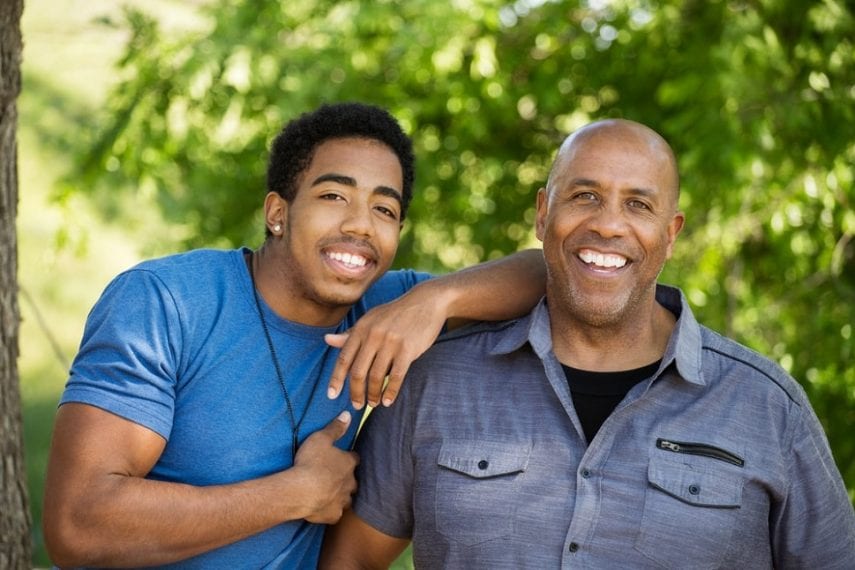How to Help Your Parent in Rehab: A Guide for Children of Addicted Parents

When your parent begins an addiction rehab program, it’s important to be able to distinguish your responsibilities from theirs in recovery. Even as they walk their path to greater awareness and grace in everyday life, you’ll be navigating your own journey of awareness and recovery. By establishing productive boundaries and keeping an honest perspective, you can progress on your individual parallel paths to greater well-being.
For decades, Chris’s dad would end each day with glasses of wine enough to dull his emotions, his ability to relate consciously, and his children’s trust and bond with him. He is the type some might call “high-functioning”—while his daytime persona seemed bright and normal, his life was crumbling slowly around him.
It’s especially frustrating for Chris that his mom and his siblings have always felt more comfortable denying the issue and just trying to smooth things over from day to day. Eventually, the stress and underlying fear crept into all of their lives and surrounding relationships. Chris finally reached out for help on his own. With the advice of a therapist and an empowering support group, he started to feel more comfortable setting boundaries and initiating the important conversations with his family and even with his dad.
When Chris brought up the idea of addiction treatment with his father, he avoided the implication that there was something wrong with his dad and instead talked about the great things that could come of it—including the opportunity for the family to work together. Once Chris’s father had a clear picture of what to expect from a welcoming residential treatment experience, he agreed to try it. Having a parent in rehab is a challenging but rewarding opportunity to support them even as you discover your own needs and strengths.
Understanding Your Part in Your Parent's Rehab and Recovery
When your parent endures addiction, whether they eventually achieve long-lasting recovery is not your responsibility—but you can help. By learning to set and maintain boundaries, ceasing enabling behavior, and promoting progressive treatment options, you can help shine a light on the recovery path that your parent must walk.
Participate in Family Programs
One of the best things you can do to support your parent in rehab is to learn more about the nature of addiction and treatment. The best place to learn is at a professional treatment center that also values family participation to improve recovery outcomes. Program staff will be able to guide you in finding the right balance of independence and interdependence during the recovery journey in the present and into the future. When you attend family sessions, you’ll be able to offer valuable insight to help counselors and therapists better understand the situation and better help your mother or father in their recovery. Together, you’ll be able to peacefully resolve conflicts in your relationships and evolve family dynamics in productive ways. Plus, your parent will be able to experience your care and support directly during this critical time in early recovery.
Set and Maintain Boundaries
The more you learn about how addiction plays out for an individual and also for those close to them, the better you will be able to distinguish their burdens from your own. It’s easy to take personally the devastating consequences of a parent’s addiction, but their well-being is ultimately their responsibility—just as your well-being is your responsibility. It’s rarely simple to understand clear boundaries between ourselves and those who are closest to us, but it’s incredibly important to grow into this understanding for your own long-term health and the health of your relationships. Professionals who are very knowledgeable about addictive behaviors can help you to put situations into perspective, to recognize where you need to draw boundaries for yourself and others, and to have the strength to hold those boundaries even when you’re tempted to give your parent slack at your own expense.
Put an End to Enabling and Codependency
Dissolving codependency goes hand-in-hand with having healthy boundaries. The denial that many families hold onto, sometimes for years or decades, blurs those boundaries. It becomes “our addiction” rather than “his” or “her addiction” without intention or realization. “Our addiction” can be a lot harder to break and recover from because so many more details and complications are tangled up than if it were “his” or “her addiction” alone. So, an early step in the right direction is to untangle the family members’ parts—to understand that it is actually more supportive, more loving to give a parent full responsibility for their choices, actions, and well-being, even when it feels tempting to put their comfort first and shoulder more than your appropriate share of the burden.
Getting connected with a comprehensive residential treatment program is a solid step in the right direction because, here, your parent is removed from the automatic family patterns, and their own responsibility to work toward recovery is posed as first and foremost. The usual stressors and habits of everyday life are no longer distractions in the treatment environment. You can learn how to play a role that is positively integrated for the sake of everyone’s best recovery path forward.
Hope is Just a Phone Call Away
866-922-1350Understanding Your Part in Your Own Recovery
It’s a heavy but appropriate responsibility for your parent to own their recovery journey. For the same reasons, it is necessary for you to claim your own responsibilities to your holistic well-being. Yes, taking care of your will prepare you to better support your parent. But, more importantly, you deserve your own compassionate attention for your own sake. Don’t put off identifying your needs, keeping your health and your stress in check, and getting help because the healing path is one of connection, not one of isolation.
Accept the Value of Outside Support
Apart from the family therapy sessions you will experience through your parent’s rehab program, it can be tremendously supportive and transformative to have someone you can talk to one-on-one. This may be a grounded and patient family member or friend, but it may be particularly helpful to speak with a professional who is trained to help you keep all the complicated parts of your life in perspective—to maintain the boundaries that are the foundation for a truly healthy life. Over time, in this therapeutic dynamic, you can also process some of the important memories and emotions you carry from your life with an addicted parent, including the trauma that may be inaccessible to you but still affecting you on a daily basis.
Manage Your Stress
Whether your burdens derive from past trauma, current struggles with your parent, or work and general life pressure, it’s up to you how much that stress will weigh you down. The more it does weigh you down, the more your physical, mental, emotional, and spiritual health will deteriorate. While we can’t control all of the events in our lives, we can manage our relationships and reactions to these events. If this seems like overwhelming and unfamiliar territory, your counselor or therapist is the right person to guide you through it.
Take Responsibility for Healthy Coping Strategies
When the storm of your parent’s addiction feels unbearable, you may feel desperate to relieve some of the pressure. It’s important to be aware that addiction can be passed through the generations, and you are at a greater risk of substance use disorders if family members suffer from the same. Just as your parent in treatment is becoming aware of their behaviors and compulsive tendencies, you can open your eyes to any of your own coping habits that may not be altogether positive. Remember that regardless of what is going on around you, the choice about how you handle that pressure is your own to make. If that choice feels out of your control, it’s time to reach out for assistance—you don’t need to be alone in your suffering.
What It Means to Walk Separate Recovery Paths Together
There are parts of this process you can achieve together and parts that must be navigated with respect for your individual needs and responsibilities. During your parent’s rehab treatment, education and therapy sessions will allow the family to come together in a spirit of compassion, sharing, and productivity. You will get updates on how your mother or father is progressing in their individual work and learn how you can play the most helpful role moving forward. This environment is a supportive one where family members can feel safe to share their experiences vulnerably, opening up in ways that pave the way for a real transformation of family dynamics.
Even when circumstances feel hopeless, they never are. So many people have transcended that hopelessness because they found the right help. If you can help your parent uncover the inspiration, the reasons, and the path toward residential treatment, you’ll be giving them one of the best gifts they could ever have.
Alta Mira offers comprehensive treatment for people struggling with drug and alcohol addiction as well as co-occurring mental health disorders and process addictions. Contact us to learn more about our renowned programs and how we can help you or your loved one start the journey toward recovery.






